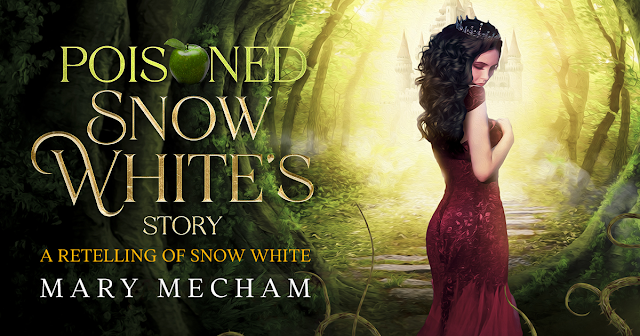Review: Poisoned: Snow White's Story
Poisoned: Snow White's Story by Mary Mecham is one of the books I was most excited about from this year's Fairy Tale Day event, especially after reading her excellent "Rumpelstiltskin" retelling that is included with a subscription to her newsletter. I thought a disability-friendly retelling of "Snow White" was an interesting concept and was eager to see how it would tie into the original fairy tale. The disability elements of the story were handled excellently and clearly had a ton of research and personal experience put into them, but I was a bit surprised by how few fairy tale elements the book contained. The "Snow White" story is rushed through in the first few chapters and is stripped down to its most basic elements to leave time for the story that the author actually wanted to tell. I think the title is a misnomer, particularly after reading another "Snow White" retelling with the same name. This is hardly Snow White's story, and she is only poisoned for little more than a page. A better title might have been Snow White and Dopey or Snow White and Grumpy because the two most important characters in the book were inspired by Dopey and Grumpy from the Disney movie.
Poisoned: Snow White's Story takes place in a world very similar to our own with no magic to speak of. You might be wondering how the magic of true love's kiss is able to break the spell on Snow White, and you will continue wondering that for a long time because it isn't explained until the end of the book even Snow White eats the poisoned apple and subsequently wakes up close to the beginning. The majority of the book focuses on the seven brothers who are inspired by the dwarfs from the Disney film, particularly Malcolm, who is an archetype of Grumpy, and Oliver, who is an archetype of Dopey. These two brothers are heavy handed metaphors for a caregiver and a person with a severe intellectual disability. This particular aspect of the book was done so well that I often forgot I was reading a fairy tale adaptation. The author got her point across successfully, but I feel that the book should have had a more honest presentation since the cover and title make it look more like a classic fairy tale retelling.
The author does a good job of portraying this version of Snow White as the character most of us are familiar with. She is kind and submissive and the story does not beat around the bush in addressing why some of those traits may work to her disadvantage. After her original fairy tale is resolved early on, she finds herself in an abusive relationship with a manipulative prince who takes advantage of her at every possible turn. She often flees to the solace of Malcolm and Oliver, where she acts as a friend to Oliver and an aid to Malcolm's caregiving. Over time, she learns just how much effort it takes to be a caretaker and gains an incredible amount of respect for Malcolm, who had to give up any opportunity to live a normal life so he could devote all his time to caring for Oliver and keep him away from danger. Oliver's unseemly appearance and erratic behavior sometimes causes problems for Snow White, especially during his first visit to the castle, but she provides every accommodation she can muster to be a friend to him and revel in his playful innocence.
The book ends in a way that I would not have expected from a "Snow White" retelling but makes perfect sense for this particular adaptation. As the queen, Snow White has access to many people and resources that most caretakers would not, placing her in a unique position to provide a happy ending for Malcolm and Oliver. However, she is afraid to stand up for herself for a large portion of the book and needs Malcolm's help to learn how to become more assertive and claim her dominance as the new queen. It is only after she is able to speak out about injustice that she can truly take advantage of her power to help those in need like Oliver. I liked how this element of the book is a nod to more modern "Snow White" adaptations like Mirror Mirror and Snow White and the Huntsman in which her peers teach her to come out of her shell, but in this case, it is done without picking up a sword, which makes this book stand apart.
I think Poisoned: Snow White's Story does a better job of telling a disability-inclusive fairy tale than Just the Way You Are by Allison M. Boot but at the expense of expanding upon the "Snow White" narrative. We barely get a chance to know Snow White's stepmother or what her life was like before she ate the apple, which I suppose isn't much of a problem considering how many other stories there are about that already. Still, I think that a different presentation for the book that places more focus on Oliver as the "Dopey" character would have provided readers with a more honest depiction of what to expect. I would first and foremost recommend this book to real-life caretakers and people who are looking for disability-inclusive stories. Fairy tale fans may also enjoy it, but I think they should be aware of how little of the story focuses on Snow White prior to reading it.












Comments
Or is she queen because she regains her place after the death of her stepmother?